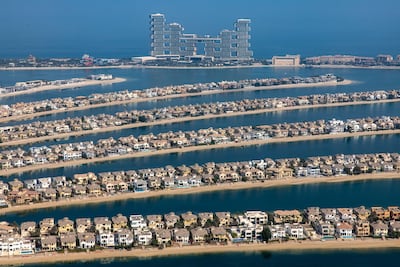The UAE economy is projected to grow by 7.6 per cent this year, the highest in 11 years, driven by both oil and non-oil sectors, according to the latest estimates by the UAE Central Bank.
The latest growth forecast is higher than the 5.4 per cent estimate made by the Central Bank in July.
Minister of Economy Abdulla bin Touq said earlier this month the country’s gross domestic product is expected to grow by 6.5 per cent this year.
The robust growth is driven by a sharp increase in oil revenue, as well as a noticeable improvement in the real non-oil GDP, the regulator said in its latest Quarterly Economic Review 2022.
“Overall real GDP continued to grow at a strong pace in the third quarter of 2022, after a robust increase in the first half of the year,” the Central Bank said in the report. “It was driven by a further rise in oil production, as well as significant improvement in the real non-oil GDP.”
However, the UAE Central Bank has revised its output growth for 2023 as Opec and its allies decided to cut oil production starting in November amid economic headwinds.
The country’s economy is projected to grow 3.9 per cent next year, down from 4.2 per cent forecast in the previous report.
The UAE economy made a strong rebound from the coronavirus-induced slowdown last year and the pace of economic momentum has continued to improve this year on the back of government initiatives and higher oil prices.
The Arab world’s second-largest economy is set to grow more than 6 per cent this year, after an expansion of 3.8 per cent in 2021, according to the International Monetary Fund.
Emirates NBD forecasts that the economy will expand 7 per cent in 2022 while First Abu Dhabi Bank projects a 6.7 per cent expansion and Abu Dhabi Commercial Bank estimates growth of 6.5 per cent.

“There are increased chances for growth being stronger in 2022 due to mainly better-than-expected performance in some of the non-oil sectors such as tourism and hospitality, real estate, transportation and manufacturing,” the Central Bank said.
Dubai hosted 11.4 million overnight international visitors in the first 10 months of the year, up 134 per cent from the same period in 2021, and is close to returning to pre-pandemic levels, according to the latest data from the Department of Economy and Tourism.
The UAE’s foreign trade is expected to reach Dh2.2 trillion ($599.4 billion) by the end of 2022 as the country's economy proves to be an exception, going against the weakening global trade growth trend amid growing macroeconomic headwinds.
The Emirates, which recorded a foreign trade volume of Dh1.9 trillion at the end of 2021, expects 15 per cent growth this year, a significant increase compared with the World Trade Organisation’s 3.5 per cent growth expectation for global trade.
Property transactions also continued to rise in the country amid a recovery in the property sector.
Off-plan and secondary property sales in Dubai reached a 12-year high in the third quarter, both in terms of volume and value, a report by Property Finder said.
A total of 25,456 sales transactions worth Dh69.72 billion were recorded in the quarter, marking an increase of about 62 per cent in terms of volume and more than 65 per cent in terms of value, compared with the third quarter of 2021.
Abu Dhabi's property market recorded 4,441 transactions amounting to $5.7 billion in the third quarter, according to the Department of Municipalities and Transport.
The UAE is also boosting its manufacturing sector. It plans to more than double the contribution of the industrial sector to the country's economy to Dh300 billion by 2031.
The UAE's oil production in the third quarter averaged 3.17 million barrels per day while the country's hydrocarbon GDP is estimated to have grown 13 per cent annually during the period, data from the Central Bank showed.
Oil GDP is projected to grow by 11 per cent and 3 per cent in 2022 and 2023, respectively, with performance in both years depending on the “evolution of the Russia-Ukraine conflict, potential global economic slowdown, further Opec+ decisions to change production levels, potential reduction in output by some of the other Opec members, and further post-Covid recovery”, the Central Bank said.
Starting last month, Opec and its allies, including Russia, agreed to cut production by 2 million bpd amid demand concerns as global economies slow down on account of rising interest rates and the Ukraine crisis.
For 2022 and 2023, the Central Bank projects that the country’s non-oil sector will expand 6.1 per cent and 4.2 per cent, respectively, on the back of the easing of pandemic-related restrictions, recovery in global travel and tourism and booming real estate and construction sectors, it said.
Along with the oil price boost, increased government and private sector spending is driving GDP growth, the Central Bank said.
Given the rally in oil and gas prices and the expected increase in production, 2022 has witnessed higher government revenue, boosting public spending further.
Government revenue increased in the first half of 2022 by 46.7 per cent on a yearly basis to Dh305.6 billion due to an increase in taxes and social contributions.
On the expenditure side, current spending rose by 6.1 per cent yearly in the first half of 2022 to Dh180.1 billion compared to 5 per cent during the same period of the previous year.
The central bank also revised its projection for the UAE headline inflation downwards to 4.9 per cent factoring the latest developments in oil prices, with the regulator forecasting average Brent prices to be around $102 a barrel in 2022, less than previously expected, in addition to a moderation in food prices, compared to a quarter ago.


